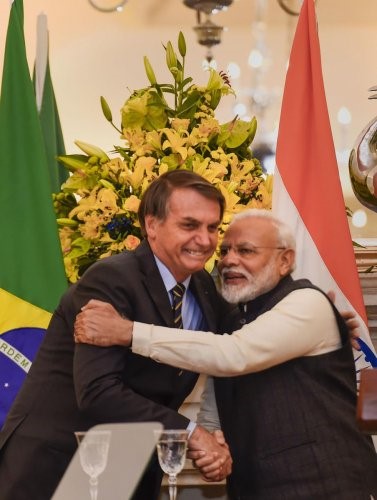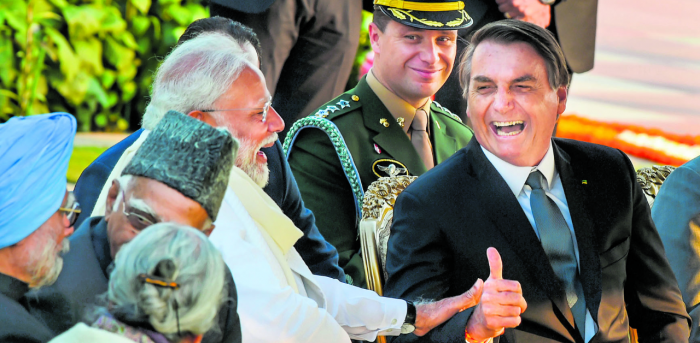
Modi and Brazil's Jair Bolsonaro are cast in the same mould
After 2014, Modi has often been compared with Donald Trump, Boris Johnson and with Brazil's far-right president Jair Bolsonaro as well. What are the similarities between Modi and Bolsonaro, and why is it so?

A CNN report on an election somewhere in the world prompted me to play quizmaster. The following text is an extract, with minor alterations, from that report, and in which I blanked out crucial words and phrases.
“The vote on ____ followed a bruising campaign season marked by bitter verbal attacks and a series of violent incidents between supporters of ____ and ____.”
“____, aged ____, ran for re-election under the conservative ____ party. He has campaigned to increase mining, privatise public companies, and generate more sustainable energy to bring down energy prices. He has vowed to continue giving ____ (about USD ____) monthly benefit scheme known as ____.”
“Often referred to as the “Trump of the ____,” ____, who is supported by key religious ____, is a highly polarising figure. His government is known for its support for ruthless exploitation of ____ in the ____, leading to record ____ figures. ____ are warning that the future of the ____ could be at stake in this election.”
“____ has also been widely criticised for his handling of the Covid-19 pandemic. More than ____ people in ____ have died from the virus.”
The report runs for several more paragraphs but by now readers would have got its gist. Almost all answers regarding what were the words in the blanks, in a straw poll conducted among friends and family, were: Narendra Modi, India, Pradhan Mantri Garib Kalyan Ann Yojana, and a few other specifics.
But this is not so in the original report. Instead, it is a straight CNN report on developments in Brazil, where the far-right incumbent Jair Bolsonaro will now have to face a run-off on October 30 against his rival, former president left-winger Luiz Inácio Lula da Silva, because the challenger on the comeback trail could not get the required 50 per cent plus votes in the first round for being straight away declared winner.
The question from the responses is, why and how Narendra Modi gets associated with words, phrases and reportage that were actually intended for the president of a country almost 15,000 km away. Are there any similarities between Modi and Bolsonaro? If there indeed is any likeness, why is this so?
Also read: Brazil election authority: Bolsonaro, Lula headed to runoff
Completely different backgrounds
The question is essential because the two could not have been brought up in more dissimilar circumstances.
Bolsonaro was born into a white, middle-class family of Italian ancestry. His father was a dentist; both attributes indicating that he grew up among the somewhat privileged, if not the elite.
In contrast, even dispelling romanticised tales of having grown up amid squalor and financial insecurity (chaiwallah and mother being a domestic worker, etc.,), Modi’s background is undoubtedly humbler. This proves that social background may be just one of the several factors that go into the shaping of an individual’s or a populist-cum-authoritarian’s persona.
Convergence of political strategies
But traits and chosen political strategies of the two converge despite them having following divergent trajectories; Bolsonaro owes his successful run to the presidency, and also a surprisingly improved performance in these elections – compared to pollsters’ findings, to religious appeals he made to evangelical Christians.
Likewise, Modi has only gone ahead on the pathway that he unabashedly indicated was his, in the assertion during a July 2013 interview to Reuters: “I’m a nationalist. I’m patriotic. Nothing is wrong. I’m a born Hindu. So yes, you can say I’m a Hindu nationalist.”
With that statement, Modi argued that it was only natural for a Hindu to also be a Hindu nationalist. Now, he is forthright in displaying his Hinduness, even when ‘performing’ in public in the capacity of prime minister – while laying the foundation of the new Parliament building or other ceremonies.
People who worked with Bolsonaro spotted the commonalities between the two. Former Brazilian Foreign Minister Ernesto Araújo, in an interview, asserted that there was a “convergence between our worldview and that of Prime Minister Modi, that you should build a nation true to its values and traditions, be proud of itself… (The two) share a close standpoint with regard to sovereignty and their idea of nation. Both leaders have appraised the concept of nationality.”
Also read: Top 10 takeaways from PM Modi’s 75th Independence Day speech
This has been a recurring theme for PM Modi. As recently as in his Independence Day speech two months ago, he asserted that pride in the past (heritage and tradition) was among his core beliefs, one that he would want every citizen to develop, if lacking in their personal makeup. He listed it as one of the five pledges that every citizen must take in the 75th anniversary year of Independence.
There is nothing wrong in giving such a call, but in a multicultural nation, it matters what is considered heritage and tradition and which strand or aspect is excluded from it.

Modi and Bolsonaro feed the narratives of each other. In January 2020, the Brazilian President was chief guest at India’s first Republic Day Parade and other celebrations after Modi secured re-election in May 2019.
The invite was extended less than a year since Bolsonaro assumed office following his 2018 victory when he declared that his election liberated Brazil from “socialism and political correctness”. The second part of this declaration would have been appreciated by Modi for even he has questioned the consensus that existed prior to his tenure.
India however, requested the Brazilian Trump Incarnate to be the guest of honour at the Republic Day Parade although the global community was no longer under any illusion of Bolsonaro’s political intent. In less than 24 hours of becoming President, he had undermined land rights of the indigenous people of Brazil and said that solution of their problems lay in assimilation, a strategy used in India by the Sangh Parivar to integrate the tribal community in the Hindu order.
Obama vs Bolsonaro
Bolsonaro’s presence in Delhi in January 2020 was in sharp contrast to Barack Obama being the chief guest in 2015 – the first Republic Day celebrations after Modi became prime minister. If in 2015 it was still important to showcase Modi as a liberal-embracing leader, by 2020, there was no need because his second triumph made it clear to the global community that they could have reservations about Modi only at the risk of losing access to India’s markets.
Also Watch: Why Brazil’s Bolsonaro stirs a storm ahead of Republic Day
Having enhanced his reputation within his own country, by virtue of being the chosen guest at the biggest celebrations in the world’s largest democracy, Bolsonaro expressed gratitude in a way that would have sounded music to the Hindu nationalist in Modi.
A letter in April 2020, that the Brazilian president wrote to the Prime Minister that he likened India’s decision to permit the export of hydroxychloroquine (HCQ) in the global fight against Covid-19 to Hanuman’s effort to help Lord Ram’s brother Lakshman with Sanjeevani Booti.
The aforementioned CNN report also reminded me of responses of foreign journalists who discussed Modi during the campaign for the 2014 polls. My biography of Modi was published in 2013 and rightly or wrongly, several foreign journalists who visited India had my name in their ‘must meet’ list.
All from the same cloth
Rarely did a conversation on Modi with a French journalist go without the other exclaiming, “he sounds so much like (Nicolas) Sarkozy”. Likewise, the Russian, other European or Latin American scribes would say that Modi reminded them of (Vladimir) Putin, (Recep Tayyip) Erdoğan and (Hugo) Chávez.
In the years after 2014, the world has seen comparisons with Donald Trump, Boris Johnson and of course, Bolsonaro. This merely indicates that leaders who occupy the space between being populist and authoritarian, are essentially cut from the same cloth. But, as the Brazilian President’s possible defeat in the run-off shows, many of them have been worsted in elections or because of losing parliamentary majority, but the likes of Modi and Erdogan reign supreme.
How and why the Indian Prime Minister continues to be the most popular populist leader in the world while his peers either falter, or have already lost office, can be part of musings on another day.
(Nilanjan Mukhopadhyay is a NCR-based author and journalist. His latest book is The Demolition and the Verdict: Ayodhya and the Project to Reconfigure India. His other books include The RSS: Icons of the Indian Right and Narendra Modi: The Man, The Times. He tweets at @NilanjanUdwin)
(The Federal seeks to present views and opinions from all sides of the spectrum. The information, ideas or opinions in the articles are of the author and do not necessarily reflect the views of The Federal)


